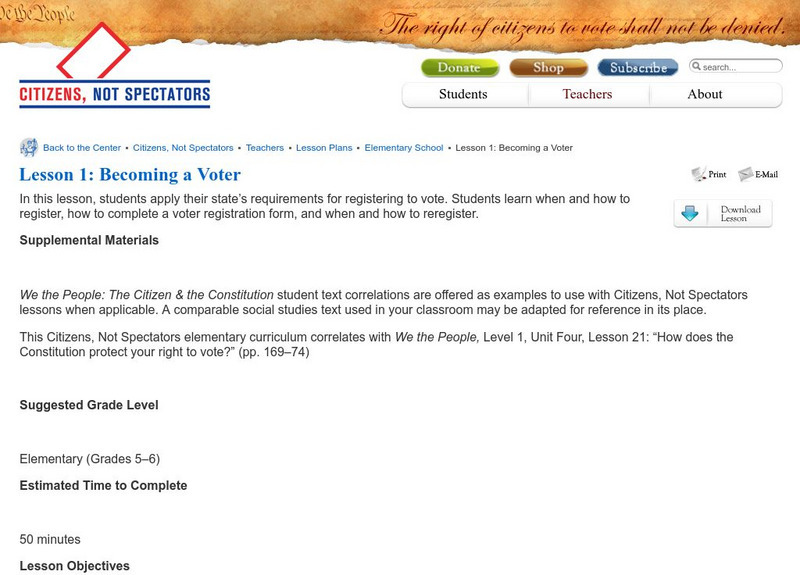Hi, what do you want to do?
Center for Civic Education
Becoming a Voter
What are the requirements to register to vote in the United States? Young citizens evaluate this process by working with handouts, informational texts, discussion, and research, as well as complete a sample voter registration form.
Center for Civic Education
Lesson 3: Becoming a Voter
Who is eligible to vote in your state? Class members examine their states' voting qualifications, complete sample voter registration forms, and chart the elections scheduled.
Teaching Tolerance
My Voice, My Voter's Guide
Class members may be too young to vote, but that doesn't mean their voices are silent! After researching key information, such as policies for registering to what to expect at the polls, young scholars create and present election guides...
Teaching for Change
A Documents-Based Lesson on the Voting Rights Act
How did the Voting Rights Act affect the daily lives of American citizens? A document-based lesson developed by the Student Non-Violent Coordinating committee (SNCC) presents a case study of the impact of the Voting Rights Act of 1965 on...
Mikva Challenge
Why Vote?
Elections are supposed to represent the will of the people. So why don't 100% of registered voters line up at the polls on Election Day? High schoolers study the last few elections and the voter turnout for each, according to race,...
Curated OER
Our Country
Second graders study about being a citizen in a democracy. They also study about the important American symbols and the process for electing the President. Students develop a creative writing story and create a drawing of a room....
Curated OER
Youth voters and election turnout
Students investigate why 18- to 24- year-olds have a low turnout at the polls. Students develop a plan to encourage young Americans to vote, or write a persuasive essay telling why they should vote.
Curated OER
Voting
Students investigate voter participation in the U.S. They watch and discuss a Bill Moyers video, complete a handout, and develop a plan to help a community overcome obstacles to voter participation.
Curated OER
Elections
Fifth graders examine the voting process, the electoral college and the voting process. They identify qualities important to a president. They fill out ballot sheets and study the registration forms.
Curated OER
What is a "vote"
Students read and discuss why we vote, and fill out worksheets on voting. In this voting lesson plan, students read and discuss the voting process, and obtain mock voter registration cards.
Curated OER
Graphs! Graphs! Graphs!
Pupils practice making charts and graphs from data on spreadsheets. Individually, they create a graph representing the latest information on voter registration. They answer questions and analyze the data to end the lesson.
Curated OER
Let the Campaign Begin
Students differentiate between positive and negative personal attributes and select a fictional character for nomination who personifies the qualities of a good leader. They use the Internet to learn about the election process and write...
Curated OER
Let the Campaign Begin
Students examine the many steps involved in the electoral process. They examine past president's campaigns and write an announcement speech for the candidate of their choice.
Center For Civic Education
Center for Civic Education: Becoming a Voter
In this lesson, young scholars apply their state's requirements for registering to vote. Students learn when and how to register, how to complete a voter registration form, and when and how to reregister.
Center For Civic Education
Center for Civic Education: Becoming a Voter
For this lesson, students apply their state's requirements for registering to vote. Students learn when and how to register, how to complete a voter registration form, and when and how to reregister.
Center For Civic Education
Center for Civic Education: Becoming a Voter
In this lesson, learners apply their state's requirements for registering to vote. Students learn when and how to register, how to complete a voter registration form, and when and how to reregister.
Other
Rock the Vote
Rock the Vote engages youth in the political process by incorporating the entertainment community and youth culture into its activities. This site includes information about current campaigns, issues, voting, a voter registration form,...





















